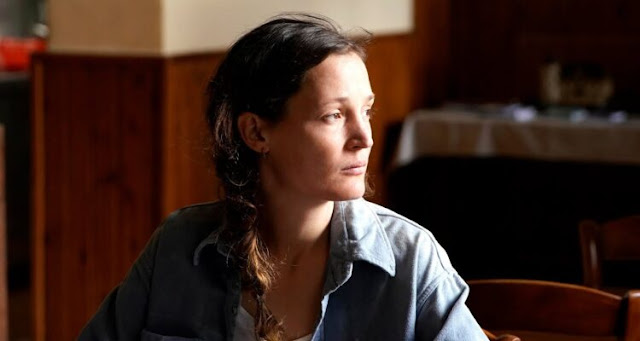Sometimes a film can "hold you tight." Can you attempt to reach into a film, or a hyper-realist painting and almost feel it? There's a rigor and closeness to Mathieu Amalric's movie, which he ambitiously directed and adapted from a play by Claudine Galea. It's quite bewildering to even fathom this movie as a play, as the movie is so tactile and visual and close, hopping time periods, locales and textures.
When watching Vicky Krieps' Clarisse in an early scene, it's was hard not to think of Meryl Streep’s Joanna in Robert Benton's Kramer vs. Kramer leaving her child behind. Clarisse wordlessly says goodbye to her children and slips out into the early morning. She pulls out of her copper-toned late-70s Pacer and listens to classical piano music. Later, as she's on the road, the disorientated husband and father Marc (Arieh Worthalter) ambles together breakfast. At first, it all feels very Kramer vs. Kramer (what are the moralities, ethics, the societal inferences of this situation?) and very 1979. Yet Amalric's film soon reveals it's up to something less straightforward and more tricky, confounding--kicking around with one's emotions themselves.
It's also a haunted house movie of sorts--the house being an unmissable character unto itself--a greyish, ancient, roomy two-story beauty filmed in Ganties. Its soft color palate walls are chipped and grimy--one bearing the penciled-in heights of the children. In some ways, as homes often are, it can be the centerpiece of the film as Clarisse's psychology and predicament becomes more floaty and tenuous. And even the house changes sometimes, with things being ripped from the wall (all of Clarisse's cluttering of beauty products)--the piano reverberating through rooms with the daughter's (Anne-Sophie Bowen-Chatet and Juliette Benveniste) halting, then suddenly virtuosic playing (soon, she dresses up in a gray wig, attempting to embody Martha Argerich). Music ends up being a crucial crux of the picture--in its sense of physical movement, and also its senses of orientation and disorientation.
While Clarisse's scrambled thoughts (like the memory game of upside down Polaroids) of the present (?), past (?), future (?) are what molds this movie's fractured narrative journey, but the film never feels cutesy or too clever for its own good. Krieps admirably carries everything with verve and unending sensitivity--it's a quality that's difficult to describe because it's so indelible (one could say the same of Streep's turn in Kramer--another performance that shapes the movie as much as the movie attempts to shape the performer's character). She is also framed well with gorgeous, earthy cinematography by Christophe Beaucarne. The fluidity of the film is no doubt due to the remarkable editing job by François Gédigier. In a film full of many strengths, its editing is one of its most laudatory aspects.
Ultimately the movie arrives to its thud of "reality." That situation didn't hit as hard as it seemed to want to--maybe since the film around it is so busily arranging the tactile tapestry of the might-have beens and the what-could-bes. Perhaps that's the point as well--unearthing and confronting the "reality" is less blunt to the spectator than than the continuous burying of it, fleeing from it, re-imagining of it. I was much more moved by and emotionally invested in the lingering sensualities and melancholic flourishes such as Krieps singing along to the lush J.J. Cale mid-70s Serge Gainsbourg-esque song "Cherry" in that brown vehicular spaceship (almost the contemporary arthouse grief-struck version of Doc Brown's DeLorean). ***
-Jeffery Berg





No comments:
Post a Comment